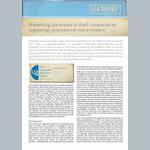The Panama Papers and why secrecy regulations are bad for development

Secrecy regulations and lacking transparency facilitate criminal activities because it hides away evidence. People who pay bribes, trade weapons, evade taxes, deceive trade partners, and smuggle humans, narcotics, animals and drugs, all destroy the positive development outcomes that we strive for. The Panama Papers offer a glimpse into activities and actors relying on secrecy services. The U4 Anti-Corruption Resource Centre shows you six publications for donors to quickly grasp this complex field.
The Panama Papers is a global investigation by the International Consortium of Investigative Journalists into a professional service industry offering secrecy and ways to not pay tax in many countries around the world. The investigation has exposed people and companies who use anonymity services. Countries with secrecy laws or lax control of economic activities host millions of transactions where nobody can look into the involved assets, financial risks, ownership or corporate governance. The world doesn’t know the real extent of business and harmful dealings in secrecy jurisdictions, but the development community needs to fully grasp the problem and push for effective reforms.
U4 has analysed how tax havens, offshore centres, and secrecy jurisdictions affect development goals, and what can be done:
1. Remove anonymous shell companies for better development outcomes
A large number of countries have simply chosen not to implement the rules necessary to ensure access to beneficial ownership information. It is the developed countries that are most at fault in this respect. Both development agencies and developing country governments can create momentum to make good on these commitments by highlighting the current gap between words and action. It is only by forcefully demonstrating the connection between untraceable shell companies and the looting of already impoverished countries that we can expect progress in promoting transparency, accountability, and the associated development benefits.
Read more in
Tackling shell companies: Limiting the opportunities to hide proceeds of corruption
(U4 Brief 2012:10) by Prof. Jason Sharman, Centre for Governance and Public Policy, Griffith University, Australia.
2. Developing countries would welcome that we sweep our own backyard first
Corporate service providers set up the shell companies that are commonly used to launder illicit funds, including corrupt money that may stem from aid flows. Effectively regulating these service providers is one important way to limit money laundering and therefore make corruption less profitable. Practitioners should think outside the “development box” to start ensuring policy coherence at home, since OECD countries themselves make it easy to harbour illicit funds flowing out of developing countries. Efforts to regulate corporate service providers more strictly, and work with other government agencies and international organisations to raise the regulatory standards, can benefit developing countries significantly. While the Seychelles – a small, middle-income country and a tropical tax haven – bowed to pressure and has implemented a fairly robust regulatory regime, financial centres like the US and UK have managed to dodge similar demands.
Read more in
Preventing the misuse of shell companies by regulating corporate service providers
(U4 Brief 2013:7) by Prof. Jason Sharman, Centre for Governance and Public Policy, Griffith University, Australia.
3. How donors can act on the sensitive issues of anti-money laundering and tax evasion
Dealing with illicit financial flows (IFFs) is an important aspect of the policy coherence agenda in international development. Bilateral agencies – with their understanding of sensitive political contexts and dynamics – can identify local counterparts to champion the agenda and work with international technical teams that lack country-experience. Examples of where to start includes support to improve tax systems and strengthen anti-money laundering programmes. But be prepared for resistance. Anticipating where the obstacles can arise and preparing for them is crucial. When political elites and commercial interests sense that reforms threaten their benefits, they sometimes resort to harassment and other means to stop change. This makes it difficult – though not impossible – for bilateral agencies to advance their work on IFFs.
Read more in
Implementing the illicit financial flows agenda: Perspectives from developing countries
(U4 Brief 2012:8), by Alessandra Fontana (formerly an advisor at U4, now Governance Advisor, Development Cooperation Directorate, OECD) and Kjetil Hansen-Shino (formerly Lead Governance Advisor (Anti-Corruption), OECD, now Senior Public Sector Specialist, The World Bank).
4. Know the difference between tax evasion and tax avoidance
Non-specialists may find that the discussion on taxation and illicit financial flows is too complex. Fortunately, there’s a guide for development practitioners to help you navigate the debates. Get on top of all the key concepts illustrated by case examples and who does what to stem illicit financial flows from developing countries. Learn about why enforcing the OECD transfer pricing guidelines may be too far a stretch for a country in the early stages of developing its corporate tax regime. (For the record, tax evasion is to conceal income from the revenue authorities, which the law says you owe taxes for. Tax avoidance is to siphon off income through unintended legal loopholes so the tax man can’t touch you.
Read more in
Tax-motivated illicit financial flows: A guide for development practitioners
(U4 Issue 2014:2), by Martin Hearson (Doctoral researcher, International Relations Department, LSE, UK).
5. How rich and poor countries can jointly tackle the clear links between grand corruption and illicit financial flows
We need a major change in approach to block out illicit flows. Discover the menu of options ranging from general restriction of capital flows to anti-money laundering regimes, asset recovery, mutual legal assistance, and restricting the secrecy space.
Read more in
Corruption and illicit financial flows: The limits and possibilities of current approaches
(U4 Issue 2011:2) by Quentin Reed (Governance/anti-corruption consultant) and Alessandra Fontana (formerly an advisor at U4, now Governance Advisor, Development Cooperation Directorate, OECD).
6. Get street-wise in the international financial system
Corrupt regimes use the international financial system to divert national wealth for their own benefit and to conceal the proceeds of corruption and illicit gains. Without access to this system, they wouldn’t have the means and incentives to loot state assets on such a scale. Read about how stolen money is hidden in practice through multiple accounts, bribes, secrecy products, layering and integration (breaking the financial links with the criminal origin and bringing money back into the legitimate economy), wire transfers, smuggling, and more. While a good crime novel has a price, you can download this U4 helpdesk answer for free:
Corruption and the international financial system
(U4 Expert Answer, September 2009) by Marie Chêne, Knowledge and Policy Manager, Advocacy and Research Group, Transparency International, Berlin).
- Corruption
- Tax and Public Finance
- Democracy and Governance
- PanamaPapers
- Corruption
- Anti-Corruption
- Taxation
- Illicit financial flows
- Secrecy jurisdictions
- Governance
- Money laundering
- Political corruption
- Policy coherence
- Tax havens
Publications
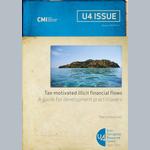
Tax-motivated illicit financial flows: A guide for development practitioners
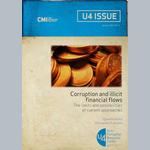
Corruption and illicit financial flows: The limits and possibilities of current approaches
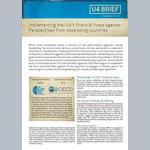
Implementing the illicit financial flows agenda: Perspectives from developing countries
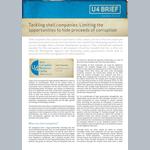
Tackling shell companies: Limiting the opportunities to hide proceeds of corruption
